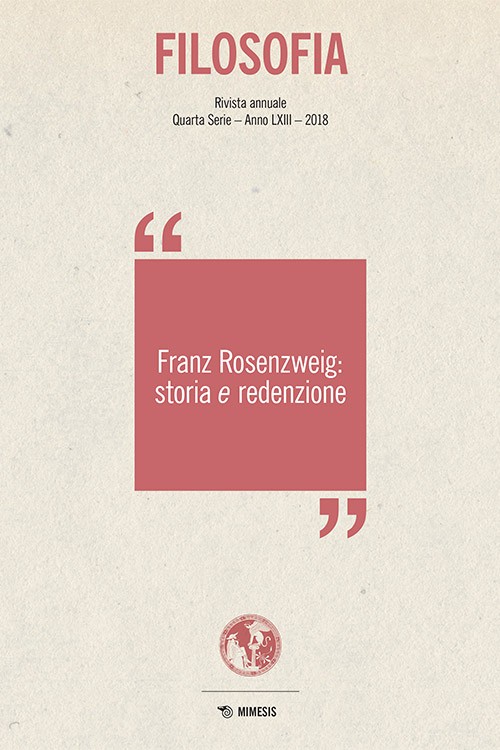From Correlation to "Gestalt". Cohen’s and Rosenzweig’s Foundations of Dialogue Philosophy
DOI:
https://doi.org/10.13135/2704-8195/3794Parole chiave:
correlation, Gestalt dialogue, philosophy of dialogue, Franz RosenzweigAbstract
A search for the foundations of the philosophy of dialogue turns the researchers to Hermann Cohen and Franz Rosenzweig. The two philosophers did not consider their theory as specifically dialogue-oriented, but they both contributed greatly to the development of the philosophy of dialogue. It is important that Rosenzweig is Cohen’s successor, so that their ideas give a good illustration of the new philosophy’s appearance and development. The purpose of this article includes the study of the contribution of Cohen to the philosophy of dialogue; the analysis of Rosenzweig’s concept and its comparison with Cohen’s philosophy; elucidation of the continuity of the two philosophers and the further development of the philosophy of dialogue in connection with the concepts of Cohen and Rosenzweig.
Downloads
Riferimenti bibliografici
M. M. Bakhtin, Besedy s V. D. Duvakinym [Conversations with V. D. Duvakin] (1993-1994), ed. by S. G. Bocharov, V. Radzishevskii et al., Moscow, Soglasie, 2002.
M. M. Bakhtin, Sobranie sochineniy [Collected Works], vol. 1, Filosofskaya estetika 1920-kh godov [Aesthetic Philosophy of the 1920s], ed. by S. G. Bocharov and N. I. Nikolaev, Moscow, Russkie slovari, 2003.
G. S. Batischev, Vvedenie v dialektiku tvorchestva [Introduction to Dialectics of Creativity], Saint Petersburg, RKhGI, 1997.
V. N. Belov, Yavlyaetsya li German Kogen neokantiantsem? [Is Hermann Cohen a Neo-Kantian?], in “Kantovskiy sbornik”, 2015, n. 3 (53), p. 42.
S. H. Bergman, Dialogical Philosophy from Kierkegaard to Buber (1974), Engl. transl. by A. A. Gerstein, foreword by N. Rotenstreich, Albany (NY), State University of New York Press, 1991.
V. S. Bibler, Mikhail Mikhailovich Bakhtin, ili poetika kul’tury [Mikhail Mikhailovich Bakhtin, or the Poetics of Culture], Moscow, Progress-Gnosis, 1991.
V. S. Bibler, Na granyakh logiki kul’tury. Kniga izbrannykh ocherkov [On the Edges of the Logic of Culture. Selected Essays], Moskow, Russkoe fenomenologicheskoe obshestvo, 1997.
M. Buber, I and Thou (1923), Engl. transl. by R. G. Smith, New York, Charles Scribner’s Sons, 1958.
R. Carnap, Überwindung der Metaphysik durch logische Analyse der Sprache, in “Erkenntnis”, II (1931), pp. 219-241.
B. Casper, Das dialogische Denken. Eine Untersuchung der religionsphilosophischen Bedeutung Franz Rosenzweigs, Ferdinand Ebners und Martin Bubers, Freiburg-Basel-Wien, Herder, 1967.
H. Cohen, System der Philosophie. Erster Teil. Logik der reinen Erkenntnis (1902, 1914), in Idem, Werke, ed. by Hermann-Cohen-Archiv at the Department of Philosophy of the University of Zurich under the direction of H. Holzhey, vol. 6, introduction by H. Holzhey, Hildesheim-New York, Georg Olms, 1977, pp. 62-67.
H. Cohen, System der Philosophie. Zweiter Teil. Ethik des reinen Willens (1904, 1907), in Idem, Werke, ed. by Hermann-Cohen-Archiv at the Department of Philosophy of the University of Zurich under the direction of H. Holzhey, vol. 7, introduction by P. A. Schmid, Hildesheim-Zurich-New York, Georg Olms, 2002, pp. 248 f.
I. S. Dvorkin, Kontury filosofii istorii Matveya Kagana [Outlines of Matvei Kagan’s Philosophy of History], in “Filosofiya sotsial’nykh kommunikatsiy”, 2010, n. 1 (10), pp. 87-95.
I. S. Dvorkin, Fylosofyya dialoha v poyskakh puty[Philosophy of Dialogue in Search of a Way], in Filosofs’ki dialohy 2013. Tolerantnist’ ta dialoh v suchasnomu sviti [Philosophical Dialogues 2013. Tolerance and Dialogue in Modern World], Kiev, Instytut filosofiyi imeni G. S. Skovorody, Natsional’na Akademiya Nauk Ukraïny, 2013, pp. 112-171.
I. S. Dvorkin, Analiticheskoe vvednie v filosofiyu dialoga [An Analytical Introduction into the Philosophy of Dialogue], in “Metafizika. Nauchnyy zhurnal”, 2016, n. 4 (22), pp. 8-27.
I. S. Dvorkin, Astrolyabiya. Putevoditel’ po filosofii “Zvezdy izbavleniya” Frantza Rozentsveyga [Astrolabe. Guide to the Philosophy of Franz Rosenzweig’s Star of Redemption], in F. Rozentsveyg, Zvezda izbavleniya [The Star of Redemption], Russ. transl. by I. S. Dvorkin and E. Yanduganova, ed. by I. S. Dvorkin, Jerusalem-Moscow, Gesharim, 2017, pp. 469-512.
Y. Gil’ad, ‘Iyun hashva’ati be-havanat musag hahitgalut be-hagutam shel Hermann Cohen, Franz Rosenzweig, Martin Buber [A Comparative Study of the Concept of Revelation in the Thought of Hermann Cohen, Franz Rosenzweig, Martin Buber], Haifa, Universitat Heifa, 2005.
R. Goldblatt, Topoi. The Categorial Analysis of Logic (Studies in Logic and the Foundations of Mathematics, vol. 94), Amsterdam-New York-Oxford, North-Holland Publishing Company, 1984.
J. Gordon, Der Ichbegriff bei Hegel, bei Cohen und in der Südwestdeutschen Schule hinsichtlich der Kategorienlehre untersucht, part 1, Der Begriff des Denkens bei Hegel und Cohen, Berlin, Akademie-Verlag, 1927.
R. Horwitz, Buber’s Way to “I and Thou”. An Historical Analysis and the First Publication of Martin Buber’s Lectures “Religion als Gegenwart”, Heidelberg, Lambert Schneider, 1978.
M. I. Kagan, O khode istorii [On the Course of History], ed. by V. I. Makhlin, Moscow, Yazyki slavyanskoy kul’tury, 2004.
Z. Levy, Mevaser ekzistentsializm yehudi. Mishnato shel Franz Rosenzweig ve-ye ̇hasa le-shitat Hegel [A Precursor of Jewish Existentialism. The Philosophy of Franz Rosenzweig and Its Relation to Hegel’s System], Tel Aviv, Sifriat Poalim, 1969.
V. L. Machlin, Ya i Drugoy. K istorii dialogicheskogo printsipa v filosofii XX v [I and Other. On the History of Dialogical Principle in the 20th-Century Philosophy], Moscow, Labirint, 1997.
F. Rosenzweig, The Star of Redemption (1921), Engl. transl. by W. W. Hallo, New York-Chicago-San Francisco, Holt, Rinehart and Winston, 1970.
F. Rosenzweig, The New Thinking. A Few Supplementary Remarks to the Star, Engl. transl. by A. Udoff and B. E. Galli, in Franz Rosenzweig’s “The New Thinking”, ed. by A. Udoff and B. E. Galli, Syracuse, Syracuse University Press, 1999, pp. 67-102.
Z. A. Sokuler, German Kogen i filosofiya dialoga [Hermann Cohen and the Philosophy of Dialogue], Moscow, Progress-Traditsiya, 2008.
##submission.downloads##
Pubblicato
Come citare
Fascicolo
Sezione
Licenza
Filosofia applica una licenza Creative Commons Attribution 4.0 International License a tutto il materiale pubblicato.



